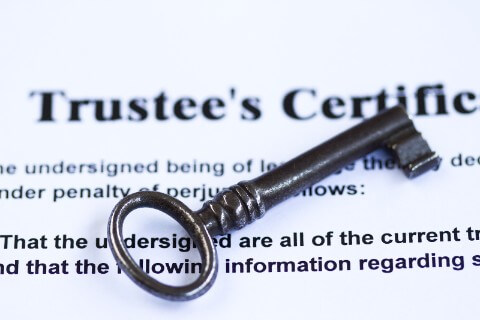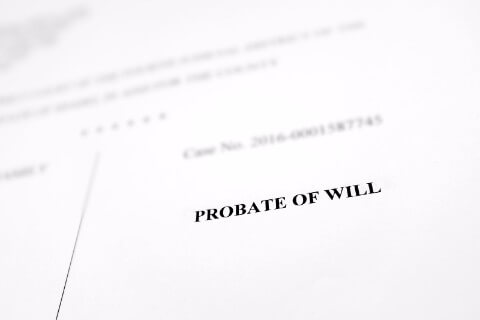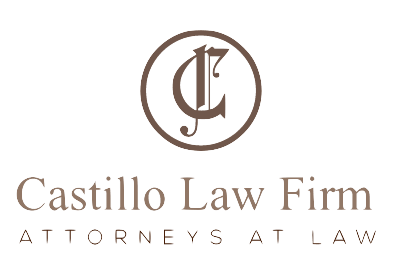Estate Planning
What is a Trust?
A trust is an arrangement under which one person, called a trustee, holds legal title to property for another person, called a beneficiary. You can be the trustee of your own living trust, keeping full control over all property held in trust.
Do you need a trust?
This is a question many people ask when they begin to plan how to distribute their assets to heirs or pay for long term care expenses.
If you’re considering your financial legacy and have at least $100,000 in liquor or real estate, or if you have assets which you want to do something specific with a trust might be for you.
Each situation is different and anyone considering a trust should discuss it with an attorney. Here are some reasons it makes sense to establish a trust.
The main reason … avoiding probate. Probate is a court process by which the will of a deceased person is proved to be valid, such that their property can in due course be transferred to beneficiaries of the will. This process generally applies to estates valued in excess of $100,000.
How much does probate cost? The answer to that question is easy because the attorney and executor fees are set by statute. Prob C §§ 10800, 10810. During the probate court process and at the conclusion, the Superior Court will award compensation as follows:
- Four percent of the first $100,000 of the estate,
- Three percent of the next $100,000,
- Two percent of the next $800,000,
- One percent of the next $9,000,000, and
- One-half percent of the next $15,000,000.
- For estates larger than $25,000,000, the court will determine the fee for the amount that is greater than $25,000,000.
This means that a parent who passes away and leaves their beneficiaries a home valued at $500,000, without a trust, would also be leaving a $13,000 bill for attorney and executor fees. A basic trust, on the other hand, may run anywhere from $1,600 to $3,000, while a more complex trust will cost a little more. Such a plan should include the trust set-up, a pour over will, a health care directive and a power of attorney. That’s a savings of around $10,000.

What is a Will?
A will is a legal document that sets forth your wishes regarding the distribution of your property and the care of any minor children. There are several types of wills. They include:
Self-Proving/Testamentary Will
A self-proving will, also know as testamentary will, is the traditional type of will with which most people are familiar. It is a formally prepared document that is signed in the presence of witnesses.
Holographic Will
Holographic wills are written without the presence of witnesses. They rarely hold up in court.
Oral Will
Oral wills are spoken testaments given before witnesses. They are not widely recognized from a legal perspective

Do I need a will?
If you have a trust, you probably already have what’s known as a “pour over will.” It distributes most personal property that is not included in your will.
Creating a will gives you sole discretion over the distribution of your assets. It lets you decide how your belongings, such as cars or family heirlooms, should be distributed. If you have a business or investments, your will can direct the smooth transition of those assets.
If you have minor children, a will lets you provide for their care. If you have children from a prior marriage, even if they are adults, your will can dictate the assets they receive. Creating a will also minimizes tensions between survivors. Relatives battling over your possessions can weaken what may have otherwise been a strong family.
If you are charitably inclined, a will lets you direct your assets to the charity of your choice. Likewise, if you wish to leave your assets to an institution or an organization, a will can see that your wishes are carried out.
What The Will Does Not Cover
While wills generally address most of your assets, there are a number of items that are not covered by the instructions in a will. These items include community property, proceeds from life insurance policy payouts, retirement assets, assets owned as joint tenants with rights of survivorship and investment accounts that are designated as "transfer on death."
What Happens If I Don't Have A Will?
If you do not have a will, when you pass away, you have then died “intestate” (without a will). In such a case, the state (through the Superior Court) will oversee the distribution of your assets. Contrary to popular opinion, the state does not inherit your assets, but rather distributes them according to the statutory scheme of California. In California, the statutory scheme often results in half of your estate going to your spouse and the other half going to your children. Such a scenario can result in the sale of the family home or other assets, negatively impacting the surviving spouse. This can create financial and emotional difficulties, particularly if your spouse was counting on the bulk of your assets to maintain his or her standard of living. Further complications can arise if your children are minors, as the court will appoint a representative to look after their interests.
Tax considerations are another important issue to consider, as a properly prepared will can minimize tax liability. This is particularly important to people with large estates. In the U.S., assets in excess of $5 million (as of 2010 or later) are taxed when they are transferred from one person to another.
How Do I Get a Will?
When you are ready to prepare a will, prepare a list of your assets and debts. Be sure to include the contents of safe deposit boxes, items of sentimental value, family heirlooms and other assets that you wish to transfer to a particular person or entity. If your estate is substantial (ranging in the millions of dollars) or your situation is legally complex, you will want to consult with our office before compiling your lists.
What happens after my will has been prepared?
The first thing is that you’ll have the peace of mind that your estate plan is in place in the case of your death. However, if you ever need to change your will, that is not very difficult. Also, you’ll want to make sure that all of the appropriate people are notified of your will (estate plan). Our office will assist you with all of these and other questions. The bottom line, however, is that making a will is a necessary and usually fairly simple process that can save your family time, money and grief as well as give you peace of mind.
Probate Process
Probate is a court process which involves collecting a decedent’s assets, notifying creditors, paying liabilities, and distributing the remaining assets to heirs. We work to guide executors and administrators through the probate process and the administration of a decedent’s estate.
How Our Law Firm Helps You
Estate Administration
We will assist in probating wills and administering the estate of people who have died, which may include filing federal estate tax returns.
Executor Representation
We assist you if a friend or loved one has passed and you have been appointed as the executor or personal representative for the estate.
Beneficiary Representation
We represent you if you are the beneficiary of a will or trust and want to be sure the executor or trustee is fulfilling their fiduciary obligations.
Avoiding Probate
We can also help your family of with the probate process, if appropriate, through the creation of a proper estate plan.

Estate Considerations
Another reason to create a trust is to make sure that your wishes are properly executed upon your passing. For instance, if you have several heirs (children, siblings, etc.), you will no doubt want to make sure that there’s no fighting among them for your assets. You will also want to make sure that each one of your heirs gets what you wanted them to have; or you will no doubt want to make sure that upon your demise certain things take place. For example, if you have a number of properties, you may want to leave one for your grandchildren, instead of just leaving everything to your children. A trust is the proper vehicle to accomplish such a goal. Also, a trust can include clauses that limit (or conditions) the amounts an heir receives. This can be useful if one of your heirs is under 25 years of age (for instance). I know parents would be uncomfortable leaving considerable sums of money to a younger heir, or they might want the heir to reach a certain age or attain a certain degree, before distribution under the trust occurs. These are considerations that need to be thought out and planned for with your attorney.
Power of Attorney

A Power of Attorney (POA) is a written authorization to represent or act on another's behalf in private affairs, business, or some other legal matter. The person authorizing the other to act on her/his behalf is known as the principal (of the power). The one authorized to act is the agent or attorney or, the attorney-in-fact.
The term attorney-in-fact is commonly used in California in place of the term agent and should be distinguished from the term attorney-at-law. An attorney-at-law in the United States is a lawyer — someone licensed to practice law in a particular jurisdiction.
As an agent, an attorney-in-fact is a fiduciary for the principal, so the law requires an attorney-in-fact to be completely honest with and loyal to the principal in their dealings with each other. If the attorney-in-fact is being paid to act for the principal, the contract is usually separate from the power of attorney itself, so if that contract is in writing, it is a separate document, kept private between them, whereas the power of attorney is intended to be shown to various other people.
Durable Power of Attorney
Under the common law, a power of attorney becomes ineffective if its grantor dies or becomes "incapacitated," meaning unable to grant such a power, because of physical injury or mental illness, for example, unless the grantor (or principal) specifies that the power of attorney will continue to be effective even if the grantor becomes incapacitated. This type of power of attorney is called a "Durable Power of Attorney.” In effect, under a durable power of attorney (DPA), the authority of the attorney-in-fact to act and/or make decisions on behalf of the grantor continues until the grantor's death.
Do I need a Power of Attorney?
A Power of Attorney can be used to give another person the right to sell a car, home, or other property in the place of the Principal. A Power of Attorney might be used to allow another person to sign a contract for the Principal. It can be used to give another person authority to make health care decisions, do financial transactions, or sign legal documents that the Principal cannot do for one on or another. With few exceptions, a Power of Attorney can give others the right to do any legal acts that the Principal could do himself or herself.
A General Power of Attorney gives the Attorney-in-Fact very broad powers to do almost every legal act that the Principal can do. When an Attorney drafts a General Power of Attorney, the document still lists the types of things the Attorney-in-Fact can do, but these powers are very broad, as opposed to being a 'Limited Power of Attorney.' People often create General Powers of Attorney to plan ahead for the day when they may not be able to take care of things themselves. By creating a General Power of Attorney, you designate someone who can do these things for you, when you cannot (for varying reasons). The Power of Attorney can also be used to create valid and legal debts in your name or it can authorize a person to pay off your debts.
Some Powers of Attorney can even give a person the right to make health care decisions for someone else. In California these are known as Advanced Health Care Directives.
The bottom line is that not everyone needs a power of attorney. But every situation is different and if you are consulting our office to prepare your estate plan, a power of attorney will be something we'll discuss and inform you about.
Call Today To Learn More
To get started on your estate plan, or for more answers to questions not covered here, call our office for a free, no-obligation consultation with one of our attorneys.
